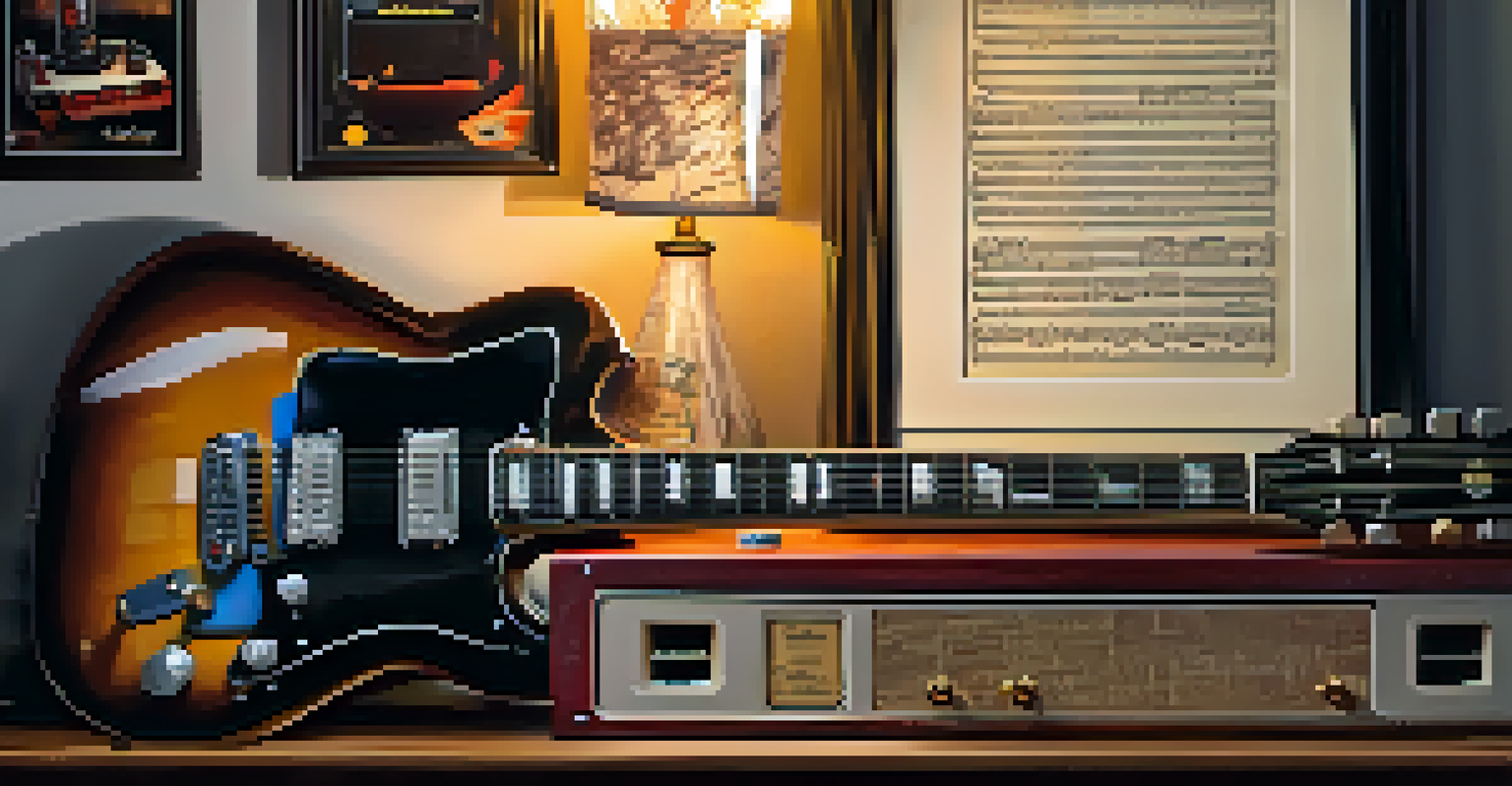Portability: Acoustic vs Electric Guitar for Musicians

Understanding Portability in Guitars
Portability is a key factor for musicians, especially those who travel or perform frequently. It refers to how easy it is to carry and transport an instrument without sacrificing sound quality. For guitarists, the choice between acoustic and electric guitars greatly influences their ability to play on the go.
The guitar is a miniature orchestra in itself.
An acoustic guitar is typically lighter and does not require additional equipment like amplifiers, making it a favorite for buskers and singer-songwriters. On the other hand, electric guitars can be bulkier due to their need for amps and cables, which can complicate transport. However, advancements in technology have introduced lightweight options for electric guitars that can ease some of these concerns.
Ultimately, portability boils down to individual needs. Musicians who prioritize ease of transport may find themselves leaning towards acoustics, whereas those focused on sound versatility may opt for electric guitars despite the extra gear.
Size and Weight Comparison
When it comes to size and weight, acoustic guitars generally win the portability race. Most standard acoustic models weigh between 3 to 5 pounds, making them lightweight and easy to carry in gig bags or cases. In contrast, electric guitars, while they can also be lightweight, often come with heavier components like pickups and hardware that can add to their overall weight.

Furthermore, the dimensions of acoustic guitars are usually more uniform, allowing for easier handling and storage. Electric guitars, however, can vary significantly in shape and size, which might affect how easily they can be transported or fit into a vehicle. This can be crucial for musicians who frequently travel by plane or public transport.
Acoustic Guitars: Easier to Transport
Acoustic guitars are generally lighter and simpler to carry, making them more portable for musicians on the go.
In conclusion, if you're looking for a straightforward option with minimal fuss, an acoustic guitar is likely your best bet. However, electric guitars have become more portable over time, so it's essential to consider your specific needs and preferences.
Setup and Additional Gear Requirements
Acoustic guitars shine when it comes to setup – or rather, the lack of it. With no need for amplifiers or effects pedals, you can simply grab your guitar and play, making it an ideal choice for impromptu jam sessions or gatherings. This simplicity is a huge advantage for musicians who want to focus solely on their playing.
Music is the shorthand of emotion.
In contrast, electric guitars require additional gear, which adds to the complexity of portability. You'll need to carry an amplifier, cables, and possibly effects pedals, all of which can quickly add up in weight and bulk. This extra gear can make electric guitarists think twice before heading out for a casual jam.
While setups can complicate transport for electric guitars, advancements like portable amps and multi-effects pedals are making it easier for musicians to travel light. Still, the choice between ease of setup and sound versatility remains a key consideration for many musicians.
Playing Environment Considerations
The environment in which you plan to play can significantly influence your choice between acoustic and electric guitars. For instance, if you're frequently playing in small cafes or outdoor spaces, an acoustic guitar may be more suitable due to its immediate sound projection and ease of use. You can simply strum away without needing to plug into anything.
On the other hand, if you find yourself playing in larger venues or with a band, an electric guitar may be necessary to compete with other instruments. Electric guitars can provide a wider range of sounds and effects that can enhance your performance in these settings. However, this often comes with the trade-off of needing additional equipment and setup time.
Electric Guitars: Versatile Sound Options
While electric guitars require more gear and setup, they offer a wider range of sounds and effects for diverse performances.
Ultimately, understanding your typical playing environment can help you make a more informed decision. Consider where you perform most often, as this can dictate which guitar will serve you best in terms of portability and sound.
Sound Quality and Versatility
When discussing portability, sound quality and versatility should not be overlooked. Acoustic guitars are known for their rich, natural sound, which can be incredibly appealing for solo performances. They offer a warm tone that resonates beautifully, particularly in intimate settings.
Electric guitars, however, have the upper hand when it comes to versatility. With the ability to use various effects and amplifiers, electric guitars can produce a wide range of sounds, from bluesy riffs to heavy metal distortions. This adaptability can be a significant advantage for musicians who want to explore different genres.
So, while acoustic guitars may be more portable in terms of ease of use, electric guitars provide a broader sound palette. Musicians need to weigh their priorities—do you prefer the straightforward, warm tones of an acoustic, or the versatile and dynamic sound of an electric?
Budget Considerations for Portable Guitars
Budget is another critical factor when choosing between acoustic and electric guitars. Generally, entry-level acoustic guitars can be more affordable and often come without the added costs of amplifiers or effects. This makes them an attractive option for beginner musicians who need a straightforward instrument without a significant financial investment.
Electric guitars, while also available at various price points, often require additional spending on amplifiers and other gear. This can quickly escalate costs, especially for high-quality equipment. For musicians on a budget, this could be a deciding factor that pushes them towards an acoustic model.
Budget Impacts Guitar Choice
Acoustic guitars often have lower upfront costs and no additional gear expenses, making them a more budget-friendly option for beginners.
Ultimately, it's essential to consider not just the initial purchase price of the guitar, but also the additional costs associated with each type. This holistic view can help you make a more informed decision that aligns with your financial situation.
Final Thoughts on Guitar Portability
In conclusion, both acoustic and electric guitars have their unique advantages and limitations when it comes to portability. Acoustic guitars offer simplicity and lightweight design, making them ideal for musicians on the move. They allow for spontaneous performances without the need for extra equipment.
On the flip side, electric guitars provide a wealth of sound options and versatility that can elevate a performance. However, this often comes at the cost of additional gear and complexity in transport. Understanding your own musical style and performance needs can help you make the right choice.

Ultimately, the best guitar for portability is the one that aligns with your lifestyle and musical aspirations. Whether you choose an acoustic or an electric guitar, what matters most is the joy of making music wherever you go.